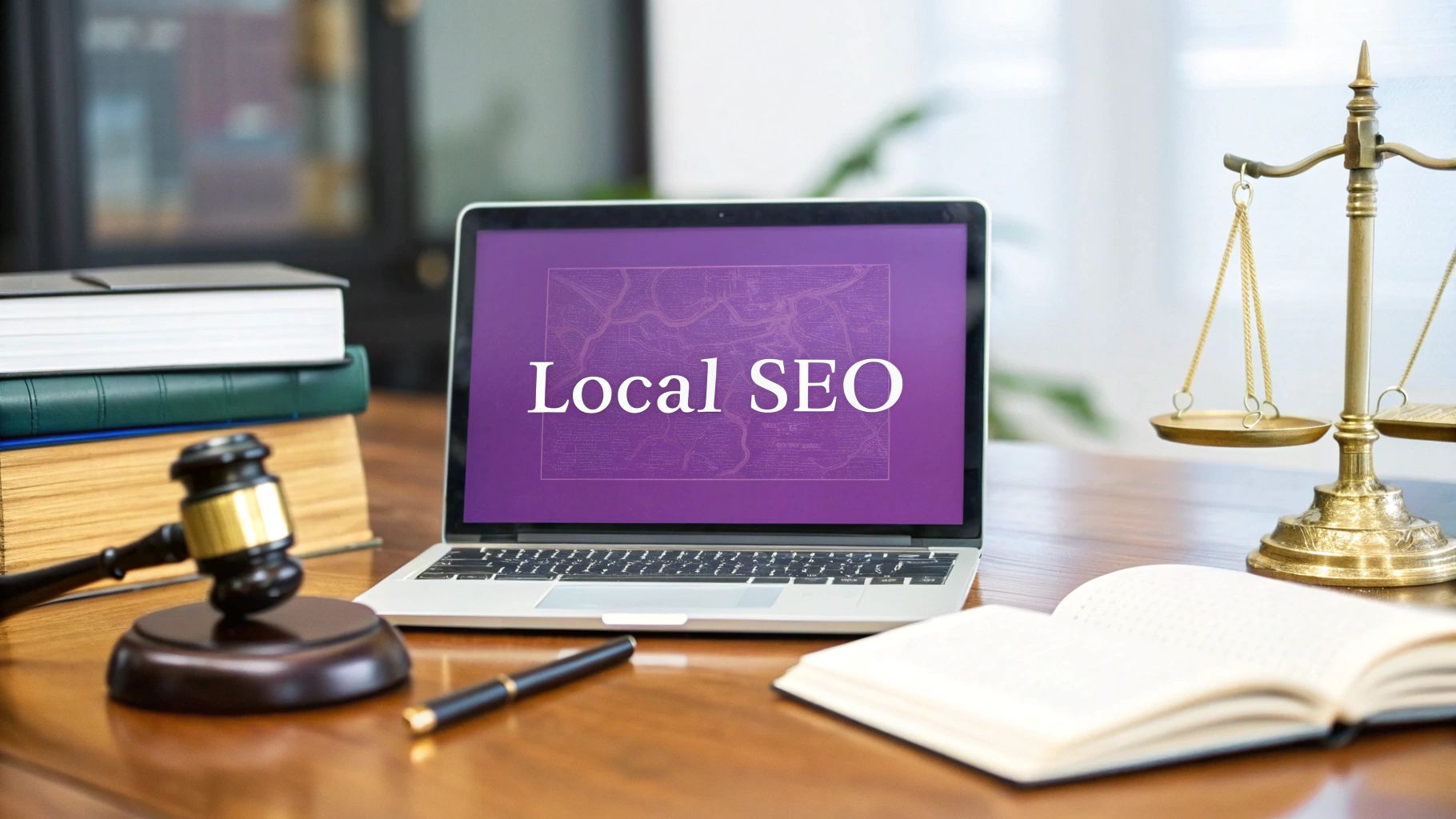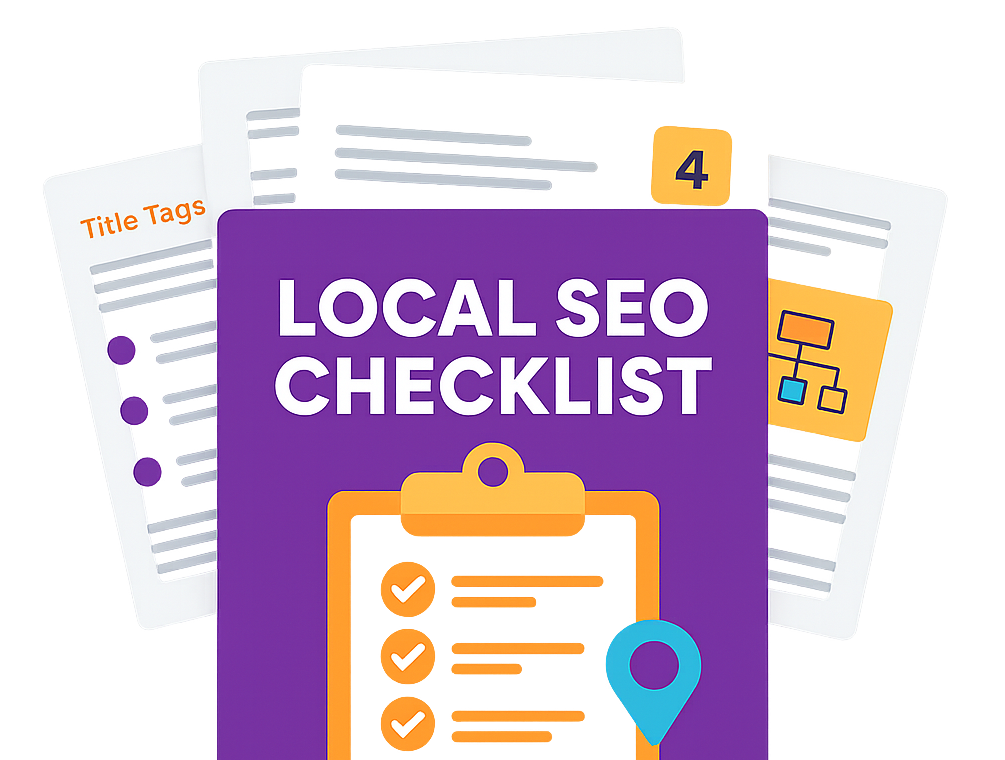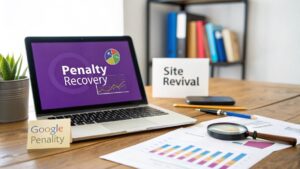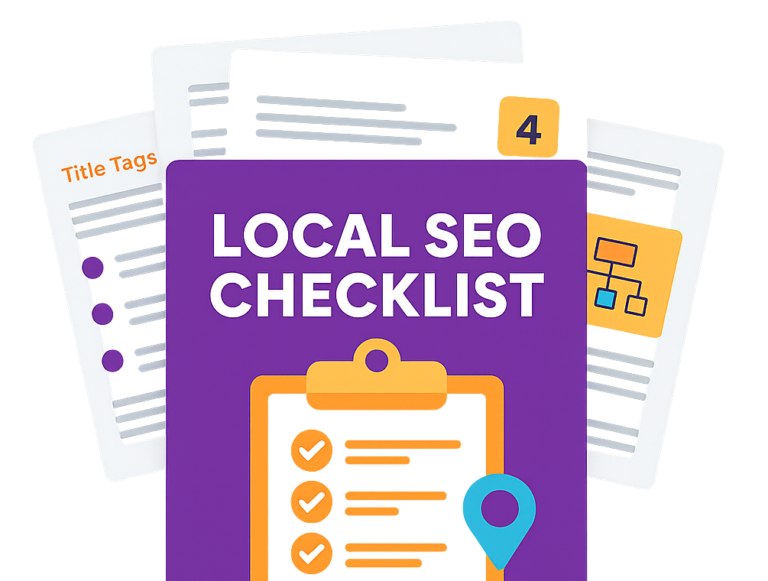Local SEO is all about making sure your law firm pops up when potential clients in your area are searching for legal help. For a UK solicitor, it's the difference between being found and being invisible when someone down the road searches for a "family law solicitor" or "criminal defence lawyer." The goal is to get your firm right at the top of Google's Local Pack and map results, which drives highly relevant, local enquiries.
Building Your Foundation for Local Search Success
Before your law firm can dream of hitting the top spot in local search, you need a solid digital foundation. This isn't about chasing the latest shiny object; it's about methodically putting the essential building blocks in place. These are the very things search engines like Google use to understand who you are, where you are, and whether they can trust you.
Get this groundwork wrong, and even the most creative SEO tactics won't get you very far. It all starts with figuring out what your potential clients are actually typing into that search bar.
Uncovering Local Keyword Opportunities
Proper keyword research for a law firm isn’t just about listing your services. It's about connecting those services to specific places. A potential client isn’t just looking for a "conveyancing solicitor"; they’re searching for a "conveyancing solicitor in Cambridge" or a "property lawyer near me."
Your first job is to uncover all these geographically-focused keywords. Think about the different ways people might phrase their legal problems in your town or city. You're essentially combining your practice areas with local modifiers.
We're talking about a simple but powerful formula: your service + your location + an intent keyword.
Here’s a quick breakdown of how these components come together to form the search queries you need to target.
Essential Local SEO Keyword Components for Law Firms
| Practice Area | Geographic Modifier | Intent Keyword | Example Search Query |
|---|---|---|---|
| Family Law | Bristol | solicitor | "family law solicitor in Bristol" |
| Personal Injury | near Reading | lawyer | "personal injury lawyer near Reading" |
| Commercial Litigation | Leeds | legal advice | "commercial litigation legal advice Leeds" |
| Employment Law | Greater Manchester | barrister | "employment law barrister Greater Manchester" |
By combining these elements, you start to build a list of high-value search terms that real clients are using. Tools that show search volume for these specific phrases can then help you decide which ones to prioritise on your website.
The Bedrock of Local Authority: NAP Consistency
One of the most critical—and surprisingly often overlooked—parts of local SEO for law firms is NAP consistency. NAP stands for Name, Address, and Phone number. Google acts like a digital detective, cross-referencing this information all over the web, from your own website to legal directories and social media profiles. It’s trying to verify that your firm is a real, legitimate business with a physical address.
An inconsistent NAP is a massive red flag for search engines. If your address is listed as 'Suite 2' on one site and 'Second Floor' on another, it creates confusion. That confusion erodes the trust Google has in your business information, which can directly tank your local rankings.
Making sure your NAP details are identical everywhere is non-negotiable. This consistency is the bedrock of your local authority, turning scattered online mentions into a powerful, unified signal that tells Google you’re credible. If you need a comprehensive guide to get this right, this detailed https://www.bare-digital.com/local-seo-checklist/ is a fantastic resource.
Essential Technical SEO Groundwork
Finally, the website itself has to be technically sound. Google wants to send its users to sites that work well, and a couple of factors are absolutely paramount for local search.
First, your site must be mobile-friendly. The vast majority of local searches happen on a phone, often when someone is out and about and needs help now. If your site is a nightmare to use on a smartphone, you’re throwing away clients. Simple as that.
Second, your website needs a logical structure. This means having clear, dedicated pages for each of your services and—if you have multiple offices—a separate page for each location. A well-organised site makes it much easier for both people and search engines to find what they're looking for. For a detailed walkthrough, you can explore this guide on how to optimise your website for local search. A clean structure directly supports all your other optimisation efforts.
How to Optimise Your Google Business Profile and Win More Clients
For many people looking for legal help, your Google Business Profile (GBP) is their first port of call. Think of it as your digital front door. It’s often the single most decisive interaction they'll have with your firm. Just having a listing isn't enough; you need to turn it into a genuine client-generation machine.
Your GBP is probably the most impactful part of any local SEO strategy for law firms. It's what gets you seen in the all-important Google 'Local Pack' map results. A fully fleshed-out, active profile builds instant trust and gives potential clients everything they need to pick up the phone.
This graphic shows how it all connects—from understanding what your clients are searching for, right through to the nitty-gritty of optimising your profile.
As you can see, a winning local SEO campaign starts with knowing what clients are actually typing into Google. That knowledge then dictates how you describe and categorise your services on your profile.
Fine-Tuning Your Profile Details
Getting the details right is what separates the top-ranking firms from everyone else. Every detail helps Google's algorithm match your firm to the most relevant local searches. Start with a solid business description that naturally weaves in your main practice areas and the locations you serve.
Next, get serious about your business categories. Google gives you a primary category and then lets you add secondary ones.
- Primary Category: Pick the most accurate, high-level option. This will usually be "Law firm" or "Solicitor."
- Secondary Categories: Now get specific. Add categories like "Personal injury solicitor," "Family law solicitor," or "Criminal justice solicitor" to catch those really targeted searches.
Defining your service areas is another must-do. List the specific towns, cities, and postcodes you cover. This tells Google exactly where your clients are, boosting your chances of showing up for searches like "divorce lawyer near me."
Engaging Clients with Posts and Photos
An active profile tells Google your firm is current and open for business. The Google Posts feature is a massively underused tool for sharing firm news, highlighting case wins (while respecting confidentiality, of course), or posting short thoughts on legal topics. Regular posts keep your profile fresh and give Google more content to index.
High-quality photos are just as important. They build instant trust and put a human face to your firm. Ditch the stock photos and upload professional shots of:
- Your legal team and individual solicitors
- The inside and outside of your office
- Your team out and about in the local community
These images give potential clients a feel for who you are before they even contact you, making your firm seem much more approachable. For a complete walkthrough, check out our guide on comprehensive https://www.bare-digital.com/google-my-business-optimization/.
Proactively Managing Questions and Answers
The Q&A section on your GBP is a goldmine for showing off your expertise. Don't just sit back and wait for questions to roll in. Seed this section yourself by posting and answering the common queries you get all the time.
Think about the top five questions a new client asks during their first call. Add these to your Q&A section with clear, helpful answers. This not only gives value upfront but also lets you control the narrative and showcase your knowledge.
This proactive approach positions your firm as a helpful authority and calms a potential client's nerves before they even have to ask. In the UK legal market, where nearly 46% of all Google searches are for something local, this kind of visibility is non-negotiable.
Once you’ve got your Google Business Profile humming, the next job is to respond to those inbound leads—fast. You can learn more about mastering inbound lead response time to dramatically improve your conversion rates. Often, a quick, professional reply is what makes a client choose you over a competitor.
Earning Trust with Online Reviews and Reputation
In the legal field, trust is everything. It’s the bedrock of every client relationship. These days, that trust-building process starts long before a potential client ever picks up the phone. It begins online, with your reviews.
Think of online reviews as the modern-day word-of-mouth referral. Your firm's online reputation is a massive signal for both prospective clients and search engines. A strong, consistent portfolio of positive reviews is a cornerstone of effective local SEO for law firms, directly impacting how you rank and whether you get that initial call.
Why Every Review Matters for Local SEO
Google’s algorithm is smart, and it pays close attention to review signals when deciding who gets top billing in local search results. It looks at the quantity, quality, and velocity (how often you get them) of your reviews. A steady stream of four- and five-star feedback tells Google that your firm is a credible, active, and respected local authority.
This digital social proof is absolutely critical. Data shows that 42% of UK consumers regularly check online reviews when looking for local businesses, and that includes law firms. Unsurprisingly, Google is the go-to platform, used by about 81% of consumers looking for legal help.
What's really telling is that these potential clients expect an average rating of at least four stars. Around 37% won't even consider a firm that dips below that threshold.
Developing a Proactive Review Generation Strategy
Sitting back and hoping reviews will trickle in is a slow, unpredictable game. The most successful firms I've worked with have a simple, ethical, and repeatable process for encouraging satisfied clients to share their thoughts. The secret is making it incredibly easy for them.
The absolute best time to ask is right after a successful case concludes, when the positive result is fresh in their mind. A quick, personalised email is usually the most effective approach.
Here’s what a good review request should include:
- A personal touch: Address the client by their name and thank them for putting their trust in you.
- A direct link: Send them straight to your Google Business Profile review page. No hunting around required.
- Simple instructions: Let them know it only takes a minute and that their feedback is a massive help to the firm.
Just a quick reminder: always stick to the SRA (Solicitors Regulation Authority) guidelines on publicity. Your review process must be completely ethical. That means no misleading claims or offering incentives that could be interpreted as paying for testimonials.
The Art of Responding to Every Review
Responding to reviews—good and bad—is non-negotiable. It shows you're engaged, that you value what clients have to say, and that you're committed to great service. This public interaction is a powerful signal to both Google and anyone vetting your firm.
For positive reviews, a simple, personalised thank you does the trick. Acknowledge their kind words and wish them well.
Negative reviews are never welcome, but they’re an opportunity to showcase your professionalism.
- Respond quickly and politely. Acknowledge their concerns without getting defensive.
- Take it offline. Offer to discuss the issue further over the phone or by email. Never get into a public debate about the specifics of a case.
- Show you care. This reassures future clients that even if something goes wrong, you handle it with integrity.
A well-managed review profile is more than just a star rating; it’s a living testament to your firm's character. This is why effective online reputation management is deeply intertwined with SEO, helping you build the trust that turns a searcher into a client.
Creating Hyperlocal Content That Connects and Converts
To really nail local SEO for law firms, your content needs to do more than just exist—it has to speak directly to the community you serve. A generic blog post about UK-wide legal updates won't cut it for a client in Bristol facing a specific local problem. A hyperlocal content strategy is your best bet for building relevance and authority exactly where it counts.
This isn't about casting a wide net. It’s about proving you’re not just any law firm, but the law firm for your specific town or city. This is how you turn a local search into a genuine client enquiry.
Build Geographically Specific Service Pages
The bedrock of your hyperlocal content plan is your service pages. So many firms make the mistake of creating a single, catch-all "Conveyancing Services" page and calling it a day. But think about it: a potential client in Manchester isn't searching for that. They're searching for a "conveyancing solicitor in Manchester."
To catch that high-intent traffic, you need to create dedicated, geographically specific service pages. Each one must be meticulously optimised for a single service in a single location. No shortcuts.
For instance, instead of one page, you could build out pages like:
- 'Family Law Solicitors in Sheffield': This page should detail your family law services while mentioning local landmarks, Sheffield's family courts, and relevant community resources.
- 'Commercial Property Lawyers in Leeds': Here, you could talk about the commercial property market in Leeds, touch on recent local developments, and explain how you help businesses in the area.
- 'Personal Injury Claims in Birmingham': This page could reference common accident spots in Birmingham or local bylaws that might affect a claim.
This level of detail sends a powerful signal to Google. It says your services are incredibly relevant to searchers in that specific area, which massively boosts your chances of showing up in the Local Pack.
Craft Blog Content with a Local Flavour
Beyond your core service pages, your blog is where you can truly shine as a local expert. The goal here is simple: create content that answers local questions and addresses legal issues specific to your community. This doesn't just attract the right kind of traffic; it also helps you earn valuable backlinks from local news outlets, businesses, and community groups.
To get the ball rolling, consider some of these hyperlocal content ideas:
- Analysis of Local Court Decisions: Break down a recent, newsworthy ruling from a local court and explain what it means for residents.
- Guides on Local Bylaws: Create a genuinely useful guide on a common local issue, like planning permission rules from the local council or specific parking fine regulations.
- Community Involvement: Sponsoring a local charity fun run or a community fair? Write about it. It shows you’re invested in the area and builds goodwill.
- Local Legal News Updates: Report on changes to local legislation or legal procedures that will directly impact the community you serve.
This kind of content does so much more than just target keywords. It forges a real connection. It proves you understand the unique legal landscape of your area and are an active, contributing member of the community.
You're not just creating content; you're building a practical library of resources tailored to your local audience. Below is a table with more specific ideas to help you brainstorm.
Hyperlocal Content Ideas for UK Law Firms
Here are some practical content examples that UK law firms can create to target specific local audiences and build authority in their community.
| Content Type | Topic Example | Target Audience | SEO Benefit |
|---|---|---|---|
| Local News Analysis | "What the New Birmingham Clean Air Zone Means for Local Businesses" | Small business owners in Birmingham | Targets local business keywords and demonstrates commercial law expertise. |
| Community Q&A Post | "Top 5 Questions We Hear About Divorce in Manchester" | Individuals considering divorce | Answers common local queries, capturing high-intent search traffic. |
| Event-Specific Guide | "Your Legal Rights: A Guide for Attendees of the Reading Festival" | Festival-goers, young adults | Attracts seasonal traffic and links from local event promotion websites. |
| Localised 'How-To' Guide | "How to Contest a Parking Fine Issued by Bristol City Council" | Bristol drivers | Provides practical value, building trust and targeting a common local issue. |
| Case Study | "Securing a Commercial Lease for a New Shop in the Shambles, York" | Local entrepreneurs | Showcases expertise with a tangible, recognisable local example. |
By consistently producing content that is genuinely useful, relevant, and local, you create a powerful digital footprint. This approach underpins a successful local SEO strategy, turning your website from a static online brochure into a dynamic resource for your community and establishing your firm as the obvious choice for clients in your area.
Nailing Your On-Page SEO and Local Link Building
Once your core local content is in place, it’s time to sharpen its focus with on-page optimisation and build your authority with local link building. Think of these two as a one-two punch: they work together to send clear, powerful signals to Google that your law firm is a trusted authority in its specific patch.
It's all about weaving local signals throughout your website without it feeling forced or repetitive. At the same time, you need to be earning links and mentions from other reputable local sources. This is what validates your importance within the community.
Strategic On-Page Optimisation
On-page SEO is the art of fine-tuning the elements on your website pages to make them crystal clear for both search engines and potential clients. For law firms, this really means weaving local context into every digital corner.
Start with your page titles and headers—these carry a lot of weight. Instead of a generic "Family Law Services," your page title should be something much more specific, like "Family Law Solicitors in Cardiff | [Your Firm Name]." That single change immediately tells Google both the service and the location.
Your headers (the H1s, H2s, and so on) should follow the same logic, breaking down the content with locally relevant terms.
A classic mistake I see all the time is "keyword stuffing"—jamming the city name into every other sentence. It reads terribly and can actually get you penalised. The goal is to integrate your location naturally within the content, meta descriptions, and even image alt-text where it makes sense.
Optimising for Multiple Office Locations
For firms with offices in more than one town or city, creating unique, optimised location pages isn't just a good idea—it's non-negotiable. Each page is essentially a digital storefront for that specific office and needs to be treated as a standalone asset.
To give each location page real power, make sure it includes:
- Unique NAP Details: The full Name, Address, and Phone number for that specific office must be front and centre.
- Embedded Google Map: Pop in an embedded map of the office location. It’s a simple but strong geographical signal.
- Localised Content: Write unique content for each page. Mention local landmarks, transport links, or even legal issues specific to that community.
- Local Testimonials: Feature reviews from clients who actually used that particular office. This builds highly targeted social proof.
Firms with lots of branches, like franchises, run into similar issues trying to create distinct online presences for each spot. For a deeper look at this, our guide on local SEO for franchisees has extra strategies that are spot on.
The Power of Local Link Building
While on-page optimisation tells Google what your site is about, backlinks and citations from other websites are like votes of confidence. When another respected local website links to yours, it signals to search engines that your firm is a credible part of the local business community.
This process starts by hunting down high-value link opportunities. And I don't mean just any old link; they have to be relevant to your location and your profession.
Prime sources for local backlinks include:
- Legal Directories: Getting a listing on respected directories like The Law Society or your local bar association is a must.
- Local Business Associations: Join your local Chamber of Commerce or other business groups and get a link from them.
- Community Sponsorships: Sponsoring a local charity, a kids' sports team, or a community event often comes with a valuable backlink from their website.
- Local News and Media: Building relationships with local journalists can lead to features or quotes that include a link back to your site.
To really get this right, you need to understand how search engines actually interpret content and links these days. Understanding the nuances of semantic search vs keyword search is crucial for any modern ranking strategy.
Auditing Your Local Citations
Finally, it's time to do a thorough audit of your existing online citations. A citation is any mention of your firm's Name, Address, and Phone number (NAP) online, even if there isn't a link. Here's the crucial part: NAP consistency is absolutely critical.
Use a tool to scan the web for every mention of your firm. Then, get it all into a spreadsheet and check that every single listing is 100% identical to the information on your website and Google Business Profile. Even a tiny variation, like "Ltd" versus "Limited," can confuse Google and water down your authority. Fixing these inconsistencies is a quick but incredibly powerful way to strengthen your local SEO foundation.
How to Measure Your Local SEO Performance
A local SEO strategy for your law firm isn't a "set and forget" job. To make sure your investment of time and money is actually paying off, you need to track your progress and be ready to adapt your approach. Measuring performance gives you the hard data needed to refine what you're doing, double down on what works, and stop wasting resources on tactics that are going nowhere.
This isn't about chasing vanity metrics. It's about focusing on the Key Performance Indicators (KPIs) that directly translate to new client enquiries. By regularly looking at the data, you can make informed decisions that drive real, sustainable growth for your firm. The best part? Powerful and free tools like Google Analytics and Google Search Console provide all the insights you need to get started.
Key Metrics to Monitor in Your Analytics
Your main goal here is simple: see a clear line connecting your local SEO efforts to an increase in potential clients. Start by digging into your website analytics to follow the journey from a local search right through to a new enquiry.
These are the core metrics you should be watching:
- Local Organic Traffic: This tells you how many visitors are finding your site through non-paid, local search results. You’ll want to filter this to see traffic from your specific target cities or regions to confirm you're reaching the right people.
- Keyword Rankings: Are you climbing up the rankings for your target geo-specific keywords, like "family law solicitor in York"? Use a rank tracking tool to see where you stand in the Local Pack and standard organic results for your most important search terms.
- Conversion Rate from Organic Traffic: This is the big one. It's the percentage of visitors from local search who actually do something valuable, like filling out your contact form, calling your firm, or downloading a guide. A rising conversion rate is a fantastic sign that your content and on-page optimisation are hitting the mark.
Tracking Google Business Profile Performance
For many potential clients, your Google Business Profile (GBP) is their very first interaction with your firm, so measuring its performance is absolutely critical. The Insights section inside your GBP dashboard is a goldmine of actionable data.
Pay close attention to the "How customers search for your business" report. This data reveals whether clients are finding you through direct searches for your firm's name or through discovery searches for a service you offer, like "commercial litigation lawyer." A high number of discovery searches is a strong signal that your optimisation is successfully capturing new clients who didn't know your firm existed.
You also need to track specific user actions that show someone is serious about getting in touch:
- Phone Calls: The number of clicks on your phone number directly from your GBP listing.
- Website Clicks: How many people clicked through to your website after seeing your profile.
- Direction Requests: A solid indicator of a potential client planning to visit your office in person.
By consistently reviewing these numbers, you can spot trends, identify opportunities, and systematically improve your local SEO for law firms, ensuring your strategy translates directly into measurable growth for your business.
Frequently Asked Questions
How Long Does Local SEO Take for a Law Firm?
That’s the million-pound question, isn’t it? While quick wins from optimising your Google Business Profile can pop up in a few weeks, a proper local SEO strategy for law firms usually needs three to six months to really start moving the needle.
Several things can speed up or slow down that timeline. Think about how competitive your local market is, your website's current standing, and how consistently you’re putting in the work. Ultimately, view SEO as a long-term investment in your firm's digital foundation, not a quick fix.
Do I Need Separate Websites for Multiple Office Locations?
Absolutely not. In fact, creating separate websites for each office is one of the worst things you can do—it just splits your authority and makes everything harder. The best approach is to stick with one main, authoritative website.
Then, for each branch, you create a dedicated and fully optimised location page.
Each of these pages needs its own unique local content. It must feature the specific Name, Address, and Phone number (NAP) for that office, alongside client testimonials that are relevant to that location. This lets you rank effectively in each target area without diluting your overall SEO efforts.
Are Paid Local Business Directories a Good Investment?
It’s a classic case of "it depends." The value is all in the directory's quality and relevance to your firm.
Investing in high-authority legal and local directories like The Law Society or your local Chamber of Commerce can be a game-changer. They create powerful citations (mentions of your NAP), which are a crucial local ranking signal. On the flip side, you should steer clear of paying for listings on low-quality, generic sites that offer little to no real value.
Ready to attract more local clients and dominate search results in your area? The specialists at Bare Digital can create a bespoke SEO strategy for your firm. Get your free, no-obligation SEO Health Check and a tailored activity plan today.








